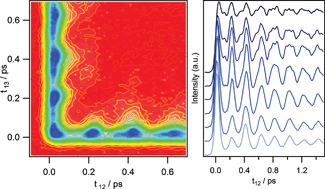The enhancement effect of vibrational coherence by femtosecond degenerate four-wave-mixing (DFWM) technique was investigated with a dye, NK-2990, doped in low temperature 1-propanol glass. The strongest enhancement was observed with the delay between the first and the second pulses, t13, set at about quarter of the oscillation period, which does not coincide with the theoretical prediction of half the period. One of the enhanced vibrational modes at ca. 90 cm−1 became significantly broader below the glass transition temperature, indicating its sensitivity towards microscopic viscosity of the environment.
You have access to this article
 Please wait while we load your content...
Something went wrong. Try again?
Please wait while we load your content...
Something went wrong. Try again?


 Please wait while we load your content...
Please wait while we load your content...